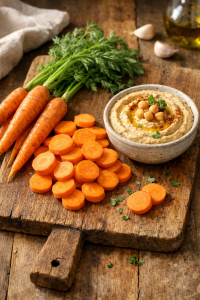We’ve all done it. One moment you’re watching someone make a salad, the next you’re deep in their other recipes, and before you know it, you’ve tapped the follow button like it’s going to reveal the secrets of becoming the next Nigella…
But here’s the thing. Unless that person pays for advertising or happens to go viral for accidentally setting their kitchen on fire mid-recipe, you’ll probably never see them again. That follow you gave so generously? It vanishes into the black hole of the algorithm, never to resurface. So why do we keep doing it?
Humans are social creatures. Even avoidant types with the emotional range of a filing cabinet are still wired to crave some sense of belonging. Following someone feels like a small social handshake, a way of saying I see you, even if your entire personality is based around reviewing different types of hummus. It tricks us into feeling closer to someone, even if we never interact again.
My friend Gemma once followed a bloke because he posted a video about why you should never microwave eggs. She’s vegan and allergic to eggs. Her reasoning? He looked like he knew what he was doing.
There is a psychological quirk called the mere exposure effect. The more we see something, the more we tend to like it. Social media flips this on its head. It whispers, you might never see this person again unless you follow right now. What if they post the best pancake recipe of all time? What if they casually reveal they dated someone famous and you miss it? Better safe than uninformed.
Tapping that follow button releases a tiny hit of pleasure, not the full firework display, more of a polite round of applause in the back of your mind. We’re novelty addicts. Following someone new is like a mini adventure that doesn’t require you to leave the sofa or put trousers on.
My cousin follows a man who reviews sheds. Just sheds. Pine, oak, plastic. Hinges. Roof pitch. She lives in a flat with no garden and no immediate plans to acquire either. But she says it soothes her. We don’t ask follow-up questions anymore.
Sometimes we follow people not because we like them, but because we want to be like them. A yogi in Bali, a minimalist in Copenhagen, a woman who drinks matcha on a mountain every morning. Following these people is like pinning dreams to your virtual fridge. It’s the modern version of cutting out magazine clippings and thinking, maybe I’ll start composting.
Before social media, people used to sit in cafés and make up stories about strangers. Now we follow someone from Prague who ice skates with her dog and wonder if her life is as serene as her feed implies. It’s not connection, really, it’s low-effort voyeurism with better lighting.
Another friend once followed a French girl because she posted a video of herself cleaning windows while listening to Edith Piaf. Just that. He now gets oddly upset when she doesn’t post. We gently pretend this is completely normal.
It helps to remember that the entire system is set up to make you follow more people. It is not a moral failing on your part. These platforms are built to keep you scrolling, keep you clicking, and keep you thinking that following just one more account might make your life better, prettier, cleverer, or at least slightly less mundane. Every follow increases the platform’s data pool, keeps you on the app longer, and in the end, feeds the machine that sells your attention to advertisers. Following strangers is not just a habit, it is a revenue stream for the people running the show. What good does this bring to your life and mental health?
One or two random follows won’t hurt. But when you’re following hundreds of accounts you don’t truly care about, your feed turns into a cluttered mess of other people’s nonsense. Meanwhile, you miss posts from your actual friends. The people you do care about get buried under seventeen reels about how to make lentils sexy.
There is nothing wrong with following strangers. It is modern people-watching with fewer pigeons and more slow motion videos of soup being poured. But next time you find yourself hovering over the follow button, pause and ask yourself if this person adds any real value. Or are you just bored? Lonely? Avoiding folding laundry?
If it’s the cheese guy from Latvia and his content genuinely changes your life, by all means, carry on. Otherwise, it might be worth resisting the urge.
The algorithm is a mysterious beast. The less you feed it strangers, the more chance you have of actually seeing people you care about. Or at least people who do not aggressively try to sell you herbal tea and bootcamps.



